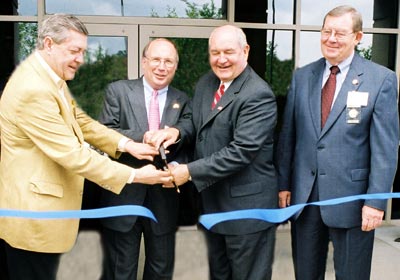LOOKING FOR A PREVIOUS STORY? CHECK THE
ARCHIVE.
Two Sides to Every Coin:
Georgia Legislature Grapples With How Best to Attract Business
Georgia Legislature Grapples With How Best to Attract Business
 |
by ADAM BRUNS, Site Selection Managing Editor
and by RON STARNER,
Site Selection Director of Publications
As a measure to enfold corporate attraction negotiations in secrecy encountered some very rough waters, another rather straightforward invitation to corporate investors sailed blissfully onward in early March in the Georgia General Assembly.
Backed by Gov. Sonny Perdue, a new law changing the state's corporate taxation formula from a three-factor approach to the single-sales-factor (SSF) approach passed both the House and Senate.
Current law apportions corporate taxation based on a formula of 50 percent sales, 25 percent payroll and 25 percent property. The new law takes it to 80 percent sales and 10 percent each for the other two factors initially, eventually dropping them entirely by 2008.
The new law follows a precedent being set in many other states, which are either phasing out other factors entirely or giving significant heft to the sales factor. In 2001, seven states had SSF, and over half the states had given more weight to the sales factor in some form.
Proponents of SSF say income taxes from newly created jobs, as well as additional sales tax revenue generated by the spending of that income, will in part make up for the coming decrease in corporate taxes . SSF opponents call it just another form of "corporate welfare."
"States are well aware of border and regional competitive
 |
| Opening ceremonies: On June 14, 2004, New York Life Insurance Company cut the ribbon to celebrate the opening of its new operations center in Forsyth County, Georgia and to welcome nearly 100 employees to the facility. Officiating for the company was Chairman and Chief Executive Officer Sy Sternberg who welcomed Governor Sonny Perdue (R-GA), Representative John Linder (R-7-GA), other local legislators and business leaders, and employees. Pictured in the photo from left are: Congressman Linder; Mr. Sternberg; Governor Perdue; and Jack Conway, chairman of the Forsyth County Board of Commissioners. |
But there's not much doubt that large corporations stand to benefit the most from the new law.
"The single sales factor mechanism is designed to attract and reward businesses that put a larger physical presence in your state and then export their sales, vs. producers outside your state that are in effect importing what they sell," says Waisanen. "The clear economic goal is to attract business to put locations in your state."
Waisanen further notes that of the handful of states that have gone over to SSF, Georgia is the only one in the southeastern region of the country.
In a coincidental and scheduled release of state revenue information one day after the law's passage, Gov. Perdue announced that February revenue collections were down by nearly 24 percent from February 2004. However, year-to-date revenue from corporate income tax was up by 82.7 percent, representing a rise of more than $126 million. Year-to-date individual income tax revenue was up 6.3 percent.
A report by Kelly D. Edmiston, published by Fiscal Research Program of the Andrew Young School of Policy Studies at Georgia State University in October 2003, analyzed the projected net revenue effects of SSF on tax years 2004-2008 based on tax return data through 2000. The report projected a decline of some $101 million in corporate income tax collections in 2004, reaching $133 million by 2008.
However, the report also projects that SSF would help multistate corporations increase payroll by $2.9 billion in 2005 and $4.6 billion in 2006. Those payroll gains would translate into personal income tax revenue gains ranging from $68 million to $139 million in 2005, and from $108 million to $221 million in 2006.
Therefore, concluded the paper, assuming the average personal income tax rate would fall at the mid-point of low and high estimates, the net revenue effects would slowly evolve from a loss of some $52 million in 2004 to steady revenue gains of $47 million in 2006, $46 million in 2007 and $45 million in 2008.
 |
| History in the making under the Georgia Gold Dome. |
Georgia Bill Would Shield
Economic Development Negotiations
A proposed Georgia bill to shield government
negotiations on economic development projects from public disclosure has
been tabled in the state Senate, but some executives with considerable
site negotiation experience say that people on both sides of the issue
may not be asking the right questions. Economic Development Negotiations
"You can't negotiate with a mob," said Scott Reed, site development engineer for Anheuser-Busch Companies Inc. in St. Louis, Mo. "You can't negotiate with 500 people; you can negotiate with five."
Reed, who has negotiated many development projects for his company, said the need for confidentiality is not to shield controversial projects from the public, but to facilitate "very serious business deals" that allow both sides to win.
"Obviously, you need to let those that need to know, know about the project," he said. "That's why it is always better to be right up front with the community's designated leaders about the particular needs of the project. And typically, there is only the need for super-secret negotiations when you are assembling very large tracts of land. But you don't do your negotiations in a public forum. At some point, the people have to have confidence in their elected officials to make decisions that are in the best interests of the taxpayers."
That's why it's imperative for public officials to do their due diligence ahead of time, Reed said. They must know what incentives they have at their disposal, what deal proposals will win public support and what won't. Furthermore, he added, public officials must be able to give the prospective employer the certainty that the community or state will support the project.
"My main purpose in meeting with any community representative is to get a sense of that community's commitment to the project," he said. "Whatever you do, don't lead me down a path and then not deliver on your promises."
Georgia economic development officials, meanwhile, claim that they are at a competitive disadvantage
 |
| Ed McCallum |
Georgia officials cite neighboring Florida and South Carolina as examples of the kind of secrecy needed to accommodate sensitive negotiations with companies.
Robin Ronne, an economic developer who has negotiated hundreds of deals for the Tampa Committee of One Hundred over the years, says Florida law permits him to keep certain aspects of negotiations confidential until they must go before a public body of elected officials for approval.
"Economic development agencies at both the state and local level have specific confidentiality exemptions from the Sunshine Laws relating to their projects — until they're announced publicly or up to two years. And certain provisions of incentives are protected for as long as 10 years, if the company requests such protection in writing," Ronne said. "But if two or more public officials from the same body are invited, then the meeting must be noticed to the media."
Ed McCallum, a nationally known site selection consultant based in Greenville, S.C., has negotiated very large and complex deals for companies like Boeing and Nissan. He says that, "From a philosophical standpoint, if the state is going to empower the economic development group to recruit business and industry, then they have to give them discretion to protect their competitive posture by allowing them the right to disclose or not to disclose."
In most cases, said McCallum, a state has already provided enabling legislation to use incentives to recruit industry, so the "public's right to know has already been satisfied."
McCallum noted that many companies do not want the public — and more importantly their competition — to know the details of a pending deal for a variety of reasons.
"The competition can extract considerable information about the deal by inference and interpretation of what was required to close the deal," he said, citing such things as capital infusion and specific research offerings at a local university. "But, most importantly, companies fear that this open disclosure policy is just the beginning of some interested parties feeling that freedom of information is a right that extends to details that are beyond the deal that are proprietary to the company."
McCallum did note that "the granting agency for any incentive has a fiduciary responsibility that must be fulfilled to make sure that funds are spent wisely. ... This is a very complex question and no two people will ever agree on the right answer."
Gene DePrez of IBM Business Consulting Services in New Jersey contends that "a certain level of confidentiality is almost always required" in deal negotiations. "From my personal experience, I think any state that cannot protect a reasonable level of confidentiality will be at a severe competitive disadvantage," he said.
DePrez said there is an alternative solution: "Many companies and investors prefer not to work with a state of public body, but through a regional private or non-profit economic development agency which can work on its behalf and better assure confidentiality until the company is ready to make a public announcement."
Georgia newspaper editorial writers, however, appear to be in agreement that House Bill 218 is not good for Georgians. Typical of the many editorials that have been written statewide in opposition to the bill is this line from the Feb. 10 edition of the Atlanta Journal-Constitution:
"It's also hard to imagine that in this modern era, the General Assembly wants to return to the days when the government rule of thumb about open records was 'nothing is open until we say it is.' Surely they think more of the voters than that."